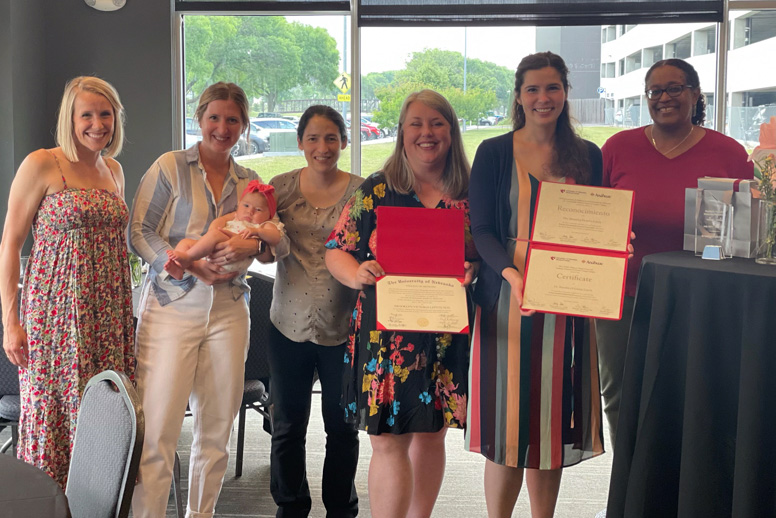Brooklyn Leitch, MD, who is finishing a two-year hospital medicine fellowship in the UNMC Department of Pediatrics, recently became the first graduate of the UNMC College of Medicine’s pediatric department’s innovative longitudinal individualized Spanish language program, ¡SÍ! (Spanish Individualized), offered through UNMC’s Pediatric Global Health Track.
Beginning in July 2021, Dr. Leitch spent two evenings a week studying Spanish virtually with faculty from the University of Anáhuac Veracruz in Xalapa, Mexico, UNMC’s partner in an individually curated program. In November 2021, she had a full immersion month with three weeks of only Spanish lessons, six hours a day, five days a week. Finally, in April of this year, she went to Mexico for two weeks of individualized intensive instruction.
Dr. Leitch is the first graduate of the pediatric department’s program, said Shirley Delair, MD, who, as the director of the Pediatric Residency Global Health Track, developed ¡SÍ! to address the changing demographics as the state’s Hispanic population nears 25%. “In addition to the wonderful support we have from our interpreters, and the efforts we are making to recruit bilingual providers, we need to develop a workforce that also is fluent in Spanish,” she said.
UNMC has been at the forefront of teaching Spanish for medical providers. The immersive Spanish program started in 2000, when Sara Pirtle of the UNMC Office of Global Engagement organized and led the first cohort of students, who completed a four-week intensive medical Spanish/global health course in Guatemala. Since then, the four-week immersive courses were offered several times each year in various locations in Latin America. In February 2020, the pandemic mandated a curtailment in international travel, which resulted, one year later, in a successful transition to a virtual model.
“The course was unique when it was first offered in 2000, due to its combination of three-weeks of individual instruction followed by a final week of volunteer medical work and complemented with cultural field trips, lectures about local medical/health issues and a local family homestay,” Pirtle said. “The intensive nature of the individual Spanish instruction remains the basis for the virtual model which emerged in 2021.”
Although the course initially targeted medical/health students, Pirtle said, residents from UNMC and non-UNMC residency programs began to take advantage of the popular course.
Currently there are two new pediatric hospital fellows and one pediatric resident in the program. Melanie Menning, MD, associate professor of family medicine, directs ¡SÍ! in the family medicine program and has four residents taking the course, as well.
In order to increase medical student interest, Dr. Delair said, an M4 elective was created in 2021 and so far about 35 students have participated.
Dr. Leitch, a Hispanic studies major as an undergraduate, left college “almost fluent” in Spanish, she said, but her Spanish skills fell by the wayside during medical school.
“By then, I was starting to see the importance from a medical perspective and from the patient’s perspective,” she said. “I also found that I enjoyed working with diverse patient populations.”
During residency in the Twin Cities, Dr. Leitch saw firsthand how language barriers impact care and was excited to find out about ¡SÍ! when she arrived at UNMC as a fellow.
In addition to individualized language instruction, she received virtual lectures on culture, explored the contrast between U.S. and Mexican health care, and practiced conducting patient interviews through practical experiences incorporated into the curriculum.
“When communicating with patients, interpreters bring a lot of value, but it also is beneficial when you don’t need that third person and you’re able to communicate directly with the patient,” she said. “The patient appreciates that — it builds rapport and shows you’ve made the effort to see from their perspective and learn their language.”
The UNMC program’s focus on language, medical Spanish and culture make it especially effective, she said.
“You get the Spanish grammar base that you need but also specifically the medical Spanish you’ll be using with your patients,” she said. “They also really focus on culture – and it’s one thing to know the language but it’s another to understand the cultural background of your patients, so I really appreciated that aspect.”’
